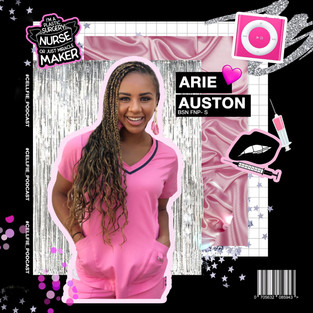12 NURSE INTERVIEW TIPS & TRICKS!
- Mar 1, 2024
- 7 min read
Updated: May 12, 2025
I’ve worked in nursing for over 10 years and let me tell you — I have spent what feels like months of my life applying and interviewing for new grad programs, travel nurse positions, per diem roles, and staff nurse jobs. Filling out online applications can be overwhelming and exhausting, but finally landing an interview definitely gives you the boost you need! In this post, I’ll review some tried-and-true nursing interview tips and tricks I have learned along the way.

12 NURSE INTERVIEW TIPS & TRICKS!
Interviews are nerve-racking no matter how experienced you are! However, keeping calm under pressure is a true skill that takes time to master. If you’re smart, you’ll learn and practice these skills before your first official interview. Here are a few insights that helped me land my favorite jobs.

INTERVIEW BASICS
1. DRESS THE PART!
While it would be nice to think that nurse managers don’t judge a candidate's professionalism by how they present themselves, it’s simply not true. However, this doesn’t mean that you need to spend a month’s salary on a designer outfit or briefcase. The best thing you can do is wear something that makes you look and feel confident. Here are some nursing interview outfit ideas to get you started.
Women:
A skirt or pantsuit with jacket and button down collared shirt or blouse
Skirts or dresses should be knee-length
Avoid flashy colors or patterns
Heels should be low or wear flats, no open toes
Pantyhose for skirts or dresses
No cleavage exposure
Natural hair color
Earrings should be studs or no bigger than dime sized
Necklace should be simple
Handbag should be neutral
No perfume or mild use of perfume
Fingernails should be short and without chips in polish
Men:
A suit is preferred with jacket and button down collared shirt
Pants and jacket should match, if they are not a suit
Tie is optional but when in doubt, wear it
Avoid bright colors or patterns
Black or brown socks, avoid wearing white socks with dark dress shoes
Black or brown dress shoes
Natural hair color and neat haircut
Mild cologne or none at all
Neat and natural fingernails
2. PORTFOLIO
For some nurses, a nursing professional portfolio could mean a binder with a resume, cover letter, and career-boosting documents like Daisy Awards, research papers, and certifications. Other nurses may prepare an electronic portfolio that can be accessed on LinkedIn.
Whether you’re a new graduate or have years of clinical experience, you’ll want to show your interviewer that you’ve prepared and are genuinely interested in the position. Show them that you’re qualified for their role and don’t be afraid to boast about your successes!
3. DO YOUR RESEARCH
Know the company & position you are interviewing for! You can start by familiarizing yourself with the organization’s mission, vision, and values. Next, learn a bit more about the patient population they serve. Again, the purpose here is to demonstrate that you’ve taken the time to prepare for this unique position — this is your opportunity to take your interviewer by surprise and get a leg up on other competing applicants.
4. ONE-MINUTE PITCH
When introducing yourself in the interview, be sure to share a bit about your personal and professional background. Why did you choose nursing? How do your experiences prepare you for this role? These are the questions interviewers will be looking for you to answer.
5. PRACTICE ANSWERING COMMON NURSE INTERVIEW QUESTIONS
While each position is unique, interviewers don’t reinvent the wheel for each candidate. Most interviews start out with a basic interview question like “Tell me a bit about yourself” and go on to ask critical-thinking and behavioral questions later in the process. You can’t know the exact questions you’ll be asked, but you can guess what they’re going to want to know about you.
Prepare by drafting answers to frequently asked nursing interview questions. That way, you’ve got a repository of answers you can use for a variety of interview questions. It can also be helpful to practice your interview with a friend or family member to perfect your flow, speed, and volume.
6. ARRIVE EARLY
Nothing adds extra stress to an interview like running behind. Be sure to arrive with plenty of time to avoid traffic, park, and figure out where you need to be. Managers will want to be sure that the employee they hire will show up for their shifts on time — be sure to put your best foot forward!
7. SMILE & MAINTAIN GOOD EYE CONTACT
For some reason, there’s a common misconception that smiling during an interview isn’t professional. In nursing, this is definitely not the case. The interviewer will want to know they’re hiring someone who’s caring, kind, and compassionate. Be sure to demonstrate these signs of strong communication skills and showcase your passion and enthusiasm. Keep it natural, like you’re talking to a trusted mentor or colleague.
8. TAKE NOTES
The interview process isn’t one sided. This is your opportunity to get to know a bit more about the hiring manager, unit, and facility as well. Taking notes can show interviewers that you’re interested in learning the details and logistics of the position. It can also help you remember points you want to get clarity on later in the interview, like scheduling expectations and onboarding requirements.
9. KEEP YOUR PHONE TURNED OFF AND TUCKED AWAY
How embarrassing would it be if you worked hard to earn and prepare for your interview, only to be distracted by a loud call or text message? The best thing to do is to keep your phone in the car and avoid the problem altogether. If you need your phone with you for safety or navigation, be sure to turn it off prior to entering the interview room.
From the moment you step foot in the building, you want your focus to be on landing the job. Your family, friends, or significant other can hear all about it AFTER it’s over and done with!
10. BRING ALONG EXTRA COPIES OF YOUR RESUME AND COVER LETTER
Some interviews may be held by a panel of hiring managers, educators, charge nurses, and HR personnel. You’ll want to make sure that everyone at the table receives your resume and cover letter. Bring along extra copies and offer them at the start of your interview.
11. PREPARE A SET OF QUESTIONS TO ASK YOUR INTERVIEWER
At the end of your interview, you’ll most likely be given the chance to ask questions before concluding. Take the opportunity to get additional insight on any professional development or research opportunities the position may offer. It’s also important to thank the interviewer for their time. Consider sending a follow-up email or note to show your appreciation for the opportunity.
LIST OF QUESTIONS TO CONSIDER:
1. What is the size of the unit, organizational structure of the unit, volume?
2. Can you explain your overall organizational structure?
3. Can you discuss your take on the hospital's culture? and philosophy?
4. What does the transition period look like? Expectations of days / nights?
5. What does the orientation look like? Preceptorship?
6. What are some recommendations of getting involved and growing within the unit?
7. What will be the greatest challenge in the job?
8. What are the greatest strengths of this department?
9. Can you describe a typical day for someone in this position?
10. What are the traits and skills of people most successful within this unit?
11. What do you like about working here?
12. RELAX - YOU'VE GOT THIS!
Trust me — if anyone knows about pre-interview anxiety, it’s me! However, I’ve learned over the years that the worst thing I can do for myself is to worry and overanalyze how things will go on the morning of the interview. At this point, you’ve put in the time and hard work. Now is when it all pays off.
Eat a good breakfast, get your favorite coffee, and listen to some pump-up music. Take a few deep breaths and remember that you deserve all of the great things coming for you.
Envision yourself getting your dream job and let that vision come to life in your interview. You are going to kill it!
Things you can do early:
♡ Spruce up your Resume
(typing it out will help you fill in the blanks & be ready to start applying)
♡ Make a list of possible references of people who would write a letter of recommendation for you (get their emails) usually need 2-3 references
♡ Participate in leadership activities at school to stand out in applications
♡ Start an excel spreadsheet of hospitals/units you would consider applying to. Find out when their new grad program applications are due.
Get Help for Every Stage of Your Nursing Journey
At NICUity, we’re so excited for you to land your dream job! We want to make sure your nursing career starts off strong, which is why we’ve got educational materials, resources, and guides to support and empower you at every step. Check out our Complete Nurse Interview eBook for additional strategies to help you ace your interview. Good luck!


Tori Meskin, MSN, RNC-NIC, has been a passionate NICU clinician since 2012, specializing in acute care and inpatient neonatal settings throughout Southern California. Board-certified in neonatal intensive care, she also brings extensive experience as a travel NICU nurse. Tori is the co-founder of NICUity, a modern resource hub empowering NICU professionals with hands-on tools, education, and community support. As a mother, wife, and entrepreneur, she shares her journey balancing life at the bedside with motherhood, marriage, content creation, and building a brand. Discover her latest tips, tools, and insights at www.tipsfromtori.com or reach out at abbysocialmgmt@gmail.com.





























